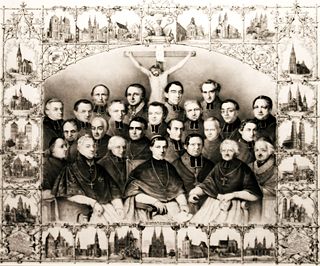
The Catholic Church in Germany comprises 7 ecclesiastical provinces each headed by an archbishop. The provinces are in turn subdivided into 20 dioceses and 7 archdioceses each headed by a bishop or an archbishop.

The Catholic Church in Germany comprises 7 ecclesiastical provinces each headed by an archbishop. The provinces are in turn subdivided into 20 dioceses and 7 archdioceses each headed by a bishop or an archbishop.
Alternative name: Rhenish Ecclesiastical Province
Alternative name: Upper Rhenish Ecclesiastical Province
Alternative name: Northern German Ecclesiastical Province
Alternative name: Central German Ecclesiastical Province
A co-cathedral is a cathedral church which shares the function of being a bishop's seat, or cathedra, with another cathedral, often in another city. Instances of this occurred in England before the Protestant Reformation in the dioceses of 'Bath and Wells', and of 'Coventry and Lichfield'. These two dioceses were each named for both cities that served as bishop's seats.

The Electorate of Mainz, previously known in English as Mentz and by its French name Mayence, was one of the most prestigious and influential states of the Holy Roman Empire. In the Roman Catholic hierarchy, the Archbishop-Elector of Mainz was also the Primate of Germany, a purely honorary dignity that was unsuccessfully claimed from time to time by other archbishops. There were only two other ecclesiastical Prince-electors in the Empire: the Electorate of Cologne and the Electorate of Trier.

The Diocese of Mainz, historically known in English by its French name of Mayence, is a Latin Church ecclesiastical territory or diocese of the Catholic Church in Germany. It was founded in 304, promoted in 780 to Metropolitan Archbishopric of Mainz and demoted back in 1802 to bishopric. The diocese is suffragan diocese in the ecclesiastical province of the metropolitan Archdiocese of Freiburg. Its district is located in the states of Rhineland-Palatinate and Hesse. The seat of the diocese is in Mainz at the Cathedral dedicated to Saints Martin and Stephen.

The Archdiocese of Munich and Freising is an ecclesiastical territory or diocese of the Roman Catholic Church in Bavaria, Germany. It is governed by the Archbishop of Munich and Freising, who administers the see from the co-cathedral in Munich, the Frauenkirche, which is never called in German Munich Cathedral. The other, much older co-cathedral is Freising Cathedral.

The Archdiocese of Freiburg im Breisgau is a Roman Catholic diocese in Baden-Württemberg comprising the former states of Baden and Hohenzollern. The Archdiocese of Freiburg is led by an archbishop, who also serves as the metropolitan bishop of the Upper-Rhine ecclesiastical province for the suffragan dioceses of Mainz and Rottenburg-Stuttgart. Its seat is Freiburg Minster in Freiburg im Breisgau.

The Archdiocese of Hamburg is a Latin Church ecclesiastical territory or diocese in the north of Germany and covers the Federal States of Hamburg and Schleswig-Holstein as well as the Mecklenburgian part of the Federal State of Mecklenburg-Vorpommern. In terms of surface area it is the largest in Germany. It is characterized by its situation as a diocese in the Diaspora. Seat of the archbishop is the New St. Mary's Cathedral in Sankt Georg, Hamburg. On January 26, 2015 Stefan Heße, Generalvikar of the Archdiocese of Cologne, was appointed Archbishop of Hamburg.

The Archdiocese of Berlin is a Latin Church ecclesiastical territory or archdiocese of the Catholic Church in Germany. The archepiscopal see is in Berlin, with the archdiocese's territory extending over Northeast Germany.

The German Bishops' Conference is the episcopal conference of the bishops of the Roman Catholic dioceses in Germany. Members include diocesan bishops, coadjutors, auxiliary bishops, and diocesan administrators.

The Prince-Bishopric of Paderborn was an ecclesiastical principality (Hochstift) of the Holy Roman Empire from 1281 to 1802.

The Archdiocese of Cagayan de Oro is an archdiocese of the Roman Catholic Church in the Philippines.

The Freising Bishops' Conference was founded in 1850. In it the bishops of the Archdiocese of Munich and Freising in southern Bavaria, with the suffragans of Regensburg, Passau and Augsburg as well as the Franconia Archdiocese of Bamberg with the suffragans of Würzburg, Eichstätt and Speyer are represented. The bishops of these dioceses meet since 1867 twice a year at the Freising cathedral hill, its leader, the Archbishop of Munich and Freising ; Substitute is the Metropolitan of the northern Bavarian ecclesiastical province of Bamberg . The territory of the diocese of Speyer, although now part of the federal states of Rhineland-Palatinate and Saarland, the boundaries of the Province of Bamberg are unchanged since 1920/1945 - with the exception of the assignment of Thuringia areas of the diocese of Würzburg in the diocese of Erfurt - which is why the Palatinate canonically continues to be a part of Bavaria. The Freising Bishops' Conference has the mission to promote common pastoral duties to coordinate the church's work and provide a platform for mutual consultation. Unlike the German Bishops' Conference, supported by the Bavarian bishops in 1933, it has no decision making powers.

The Würzburg Bishops' Conference of 1848 was a four-week workshop of the German Catholic bishops in Würzburg. It can be regarded as the birth of the German and Austrian bishops' conferences.
List of Roman Catholic dioceses in Germany between 1821 and 1993